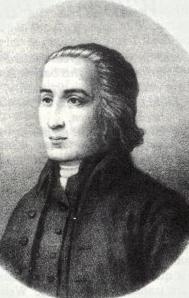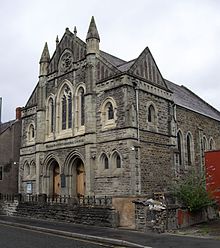William Williams Pantycelyn
William Williams Pantycelyn (also: William Williams , William Pantycelyn , Pantycelyn * ~ February 11, 1717 , Cefn-coed in Llanfair-ar-y-bryn , Llandovery , Wales ; † January 11, 1791 , Pantycelyn) is the most famous songwriter from Wales and as a writer of poetry and prose , he is considered one of Wales' greatest literary figures. At the same time he was also one of the leading figures of the Welsh Methodist Revival in the 18th century along with Howell Harris and Daniel Rowland .
Life

Williams was born in 1717 on the Cefn-coed farm in Llanfair-ar-y-bryn Parish , near Llandovery (Llanymddyfri). His parents were John and Dorothy Williams. The father died in 1742 and Dorothy then moved to the nearby farm Pantycelyn ("Holly Hollow"). The family was one of the nonconformists . William Williams first received a local school education and then went to a nonconformist academy at Talgarth .
He wanted to become a doctor, but changed his plans in 1737/38 when he was converted through the sermons of Howell Harris in Talgarth. Williams spent most of his life in Llanfair-ar-y-bryn Parish . He died in Pantycelyn on January 11, 1791, at the age of 74, and was buried in the Llanfair-ar-y-bryn cemetery. A memorial chapel was built in Llandovery in his memory .
Religious background
Williams felt called to be a priest and was ordained a deacon of the Anglican Church in 1740, despite his family ties to the nonconformists .
He initially served as a curate for Theophilus Evans (1693-1767) in the parishes of Llanwrtyd , Llanfihangel Abergwesyn and Llanddewi Abergwesyn . During this time he came into contact with the Methodist movement and in June 1742 his activities were reported by dissatisfied church members to the Archdeacon's Court in Brecon . Methodism was originally a reformist group within the Church of England and did not want to develop its own sect or church. Even so, the movement was viewed as a threat and in 1743, when Williams duly requested ordination as a priest, his application was rejected due to his Methodist ties. Now he had to choose between a comfortable but conformist career in the Church of England and a financially insecure but spiritually richer life as a Methodist preacher outside the church. He chose the latter route.
English Methodism was founded around 1739 when brothers Charles and John Wesley (both Anglican priests) broke with Moravian Church and founded their own church in Bristol . In 1743 they published their General Rules . It was during this time that Williams began his own ecclesiastical career, and that explains why he was so hostile. He paid a heavy price for his conviction.
Welsh Methodism began before 1739 and can be traced back to the conversions of Howell Harris and Daniel Rowland in 1735. It is a local movement that ran parallel to the development in England. The Welsh Methodists were mostly Calvinists , more closely related to George Whitefield than to John Wesley.
In Wales, tensions arose between the Welsh Calvinistic Methodists and the Wesleyan Methodists . In 1811 the Welsh Calvinist Methodists (today: Presbyterian Church of Wales ) broke away from the Anglican Church and began to ordain their own priests. If Williams Pantycelyn had lived longer, he would have advocated this move. During his lifetime he was a strong advocate of the Calvinist doctrine of the Reformation and often warned strongly against Arminianism , Arianism , Socinianism , Sandemanians and other groups.
Williams Pantycelyn toured Wales and preached. It is said that he partly financed himself by trading tea on his travels. Not only theological ability was required, but also organizational and administrative skills. Pantycelyn was the advocate of a new connexionalism . His followers gathered in seiadau (fellowship meetings). Williams had to organize and then mentor these communities. Every successful visit to a new village made a new one necessary. And although he was not alone in his mission, the work and stress must have been enormous. At the same time, he must have been pleased to be pastor in charge of so many communities after his wish to become a priest in a small congregation had been denied.
Writer and songwriter
William Williams Pantycelyn was not only an important religious leader but also one of the most important poets and writers of his day in Wales. Its influence can be felt well into the 20th century.
His mastery as a songwriter earned him the honorary name: Y pêr ganiedydd ( the Sweet Songster , 'the lovely songwriter'), alluding to King David , the "lovely psalm poet in Israel" ( 2 Sam 23.1 SLT ).
Works
Hymns (hymns)
Some of his works were in English, but most of his works were in Welsh . In 1744 he published his first work: the first part of Aleluia , a collection of Welsh hymns.
Other collections followed:
- 1751: Hosanna i Fab Dafydd (Hosannah the son of David). Mt 21,9 LUT
- 1759: Rhai hymnau a chaniadau duwiol (some hymns and spiritual songs).
- 1762: Caniadau y rhai sydd ar y môr o wydr (The songs of those by the crystal sea). Rev 4,6 LUT
- 1763: Ffarwel weledig, groesaw anweledig bethau (Farewell to the seen and welcome to the unseen).
- 1771: Gloria in excelsis . Lk 2,14 LUT
- 1772: O'er the Gloomy Hills of Darkness
- 1774: Ychydig hymnau (Some hymns).
- 1782: Rhai hymnau newyddion (Some New Hymns).
English:
- 1759: Hosannah to the son of David .
- 1772: Gloria in excelsis .
His best known song is Arglwydd, arwain trwy'r anialwch ( Lord, lead thou through the wilderness ), which was also adapted as an English hymn: Guide Me, O Thou Great Jehovah or Guide Me, O Thou Great Redeemer . it is usually sung to the tune of Cwm Rhondda by John Hughes .
Poems
In addition, he also wrote long poems on theological and religious topics:
- 1756: Golwg ar deyrnas Crist (A View of God's Kingdom). The story of salvation and God's grace.
- 1764: Bywyd a marwolaeth Theomemphus (Life and Death of Theomemphus). The religious experience of conversion and Christian life.
Elegies on Christian leaders such as Griffith Jones ( Llanddowror ), Howel Davies ( Pembrokeshire ), George Whitefield, and Daniel Rowland .
prose
His prose and translations were also intended as edification writings:
On the 1762 revival movement from Llangeitho :
- 1762: Llythyr Martha Philopur at y Parchedig Philo Evangelius eu hathro (Martha Philopur's letter to the Reverend Philo Evangelius, her teacher).
- 1763: Atteb Philo-Evangelius i Martha Philopur (Philo-Evangelius answer to Martha Philopur).
The Awakening Movement also had a physical impact on the Awakened, so the Welsh Methodists came to be known as the Methodist Jumpers .
Williams also wrote practical guides on Christian living:
- 1777: Doctor Nuptarum neu gyfarwyddwr priodas (Doctor of Weddings or of Marriage Leaders)
- 1777: Drws y society profiad (A gateway to the experience meeting (seiadau)).
Other works
- 1762: Pantheologia, Neu Hanes Holl Grefyddau'r Byd (Pantheologia, or a history of all religions in the world).
- 1767: Crocodil Afon yr Aifft (Crocodile of the River of Egypt).
- 1768: Hanes Bywyd a Marwolaeth Tri Wyr o Sodom a'r Aifft (A story of the life and death of three men from Sodom and Egypt).
Individual evidence
- ^ Glyn Tegai Hughes, Meic Stephens & R. Brinley Jones (eds.): Writers of Wales - Williams Pantycelyn. University Press of Wales on behalf of the Welsh Arts Council, 1983: 2.
- ^ William Williams - Short biography at CyberHymnal.org.
- ↑ William Williams Phil Carradice , BBC Blogs - Wales. March 16, 2012
- ^ GT Hughes: p. 7.
- ↑ Hymnwriters & Preachers .
literature
- Glyn Tegai Hughes: Williams Pantycelyn . Writers of Wales series. Cardiff: University of Wales Press on behalf of the Welsh Arts Council. 1983.
- Gomer Morgan Roberts: Y pêr ganiedydd: Pantycelyn . 2 vols. Aberystwyth: Gwasg Aberystwyth. 1949, 1958.
- Williams, William (1717-1791) . In: Meic Stephens (ed.) (1998), The new companion to the literature of Wales . Cardiff: University of Wales Press. ISBN 0-7083-1383-3 .
- E. Wyn James: The Evolution of the Welsh Hymn. In: Dissenting Praise , ed. I. Rivers & DL Wykes, OUP, 2011.
- E. Wyn James: "Blessèd Jubilee!": Slavery, Mission and the Millennial Dawn in the Work of William Williams of Pantycelyn. In: Cultures of Radicalism in Britain and Ireland. , ed. John Kirk, Michael Brown & Andrew Noble, London: Pickering & Chatto, 2013: 95–112, 194–202. ISBN 978-1-84893-344-6 .
- E. Wyn James: The Longing and the Legacy: Liturgy and Life in the Hymns of William Williams of Pantycelyn. In: The Bulletin of the Hymn Society of Great Britain and Ireland , No. 286, Vol. 21: 5 (winter 2016) 163-78.
- Eifion Evans: Bread of Heaven: The Life and Work of William Williams, Pantycelyn. Bridgend: Bryntirion Press 2010.
- Parish of the Buzzards, Bidgood, Gold Leaf Publishing. 2000.
Bibliography in: Derec Llwyd Morgan (ed.): Meddwl a Dychymyg Williams Pantycelyn. Llandysul: Gwasg Gomer 1991.
Web links
- Williams Pantycelyn at the National Library of Wales . Gives access to a digital version of a manuscript in Williams's hand, NLW MS 77A .
- William Williams at 100 Welsh Heroes
- Hymns in eHymnBook by William Williams
- William Williams in Dictionary of Welsh Biography
| personal data | |
|---|---|
| SURNAME | Williams Pantycelyn, William |
| ALTERNATIVE NAMES | William Williams; William Pantycelyn; Pantycelyn |
| BRIEF DESCRIPTION | Welsh musician and preacher |
| DATE OF BIRTH | February 11, 1717 |
| PLACE OF BIRTH | Cefn-coed, Llanfair-ar-y-bryn , Llandovery , Wales |
| DATE OF DEATH | January 11, 1791 |
| Place of death | Pantycelyn, Wales |


